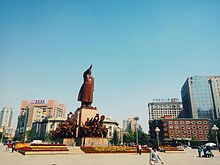Communist propaganda
While it tends to carry a negative connotation in the Western world, the term propaganda broadly refers to any publication or campaign aimed at promoting a cause and is/was used for official purposes by most communist-oriented governments.
In The ABC of Communism, Bolshevik theoretician Nikolai Bukharin wrote: "The State propaganda of communism becomes in the long run a means for the eradication of the last traces of bourgeois propaganda dating from the old régime; and it is a powerful instrument for the creation of a new ideology, of new modes of thought, of a new outlook on the world.
While all societies and civilizations have had their own unique history of development, they each pass through six distinctive stages of economic relationships sharing common characteristics, these being: primitive communism (hunter-gatherer societies), slavery, feudalism, capitalism, socialism, and finally a return to communism in a highly advanced form which is considered to be the epoch of humanity having become fully civilized.
[7] Overall, the main goal of communist propaganda is to spread the ideology of communism and to build support for the movement, both within the country where it is being disseminated and internationally.
The creation of the Soviet Union was presented as the most important turning event in human history, based on the Marxist theory of historical materialism.
Furthermore, the Communist Party of the Soviet Union became the protagonist of history, as a "vanguard of the working class", according to development of this theory by Vladimir Lenin.
Among the peasants, this new class (called Kulaks) accumulated disproportionately large amounts of wealth through merchant trading and small capital practices.
Under Joseph Stalin, the government began to crack down on the Kulaks, to which their resistance was met with violent repression in what could arguably be considered a second civil war.
Lev Kopelev, who was personally involved in actions against villagers deprived of food for collaborating with Kulaks explained his motivation:[9] It was excruciating to see and hear all this.
Our goal was the universal triumph of the Communism, and for the sake of that goal everything was permissible - to lie, to steal, to destroy hundreds of thousands and even millions of people... everyone who stood in the way.The violence that characterized the forced collectivization of agriculture in the Soviet Union eventually ended in the final years of the 1930s with the defeat of the Kulaks and their demise.
A number of periodicals were printed by communist states, either exclusively for distribution abroad or with versions tailored for foreign audiences.
Soviet films helped to create the legends of the revolution: The Battleship Potemkin, October: Ten Days That Shook the World, and The End of St. Petersburg.
Obyknovennyy fashizm (Common Fascism aka A Night of Thoughts or Triumph Over Violence) (1965) by Mikhail Romm described totalitarian propaganda on the example of Nazism.
In 2007 a high ranking intelligence officer and defector from the Eastern Bloc, Ion Mihai Pacepa, stated that in February 1960, Nikita Khrushchev authorized a covert plan (known as Seat 12) to discredit the Vatican because of its strong anti-communist stance, with Pope Pius XII as the prime target.
[15][16][17][18] As part of that plan General Ivan Agayants, chief of the KGB's disinformation department, allegedly created the outline for what was to become the play, The Deputy, which, although fictional, purports to cast doubt on the Pontiff's moral credibility with regard to the Holocaust.
J. Clews cites German, French and British estimates of the early 1960s on the amount of money spent in the world for communist propaganda and political activities in the non-communist world, estimating to about $2 billion, i.e., about $2 per person outside the communists states, with major spenders being the Soviet Union and the People's Republic of China.
[7] The basic aspects of the communist ideology, such as violent means for attaining its goals (revolution), abolition of private property and animosity towards religion were against the traditional values of the Western world and have met with strong opposition, including attempts to make the communist propaganda illegal in some states.




